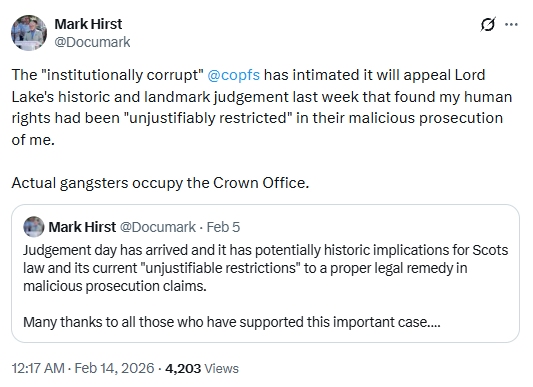THE DISCUSSION CONTINUES
Are you content to grant it?” Yes, as long as it is in line with the rules used everywhere else in the world. Take the UK as an example, because it is one of the most strict in the world with regards to ex-pats: a native who has lived outwith the UK for a continuousContinue reading "THE DISCUSSION CONTINUES"

Are you content to grant it?”
Yes, as long as it is in line with the rules used everywhere else in the world.
Take the UK as an example, because it is one of the most strict in the world with regards to ex-pats: a native who has lived outwith the UK for a continuous period of 15 years of more loses the vote in GE and referendums. I would advocate for the same to be applied to Scotland, that is, somebody who has lived 15 years or more outwith Scotland should lose the vote in Scotland. They would be able to regain it after living permanently in Scotland for a certain number of years.
It is common practice in other countries for their ex-pats to have to be registered in the country’s embassy/consulate in their foreign country of residence and as a non-resident in their native country to be able to exercise their right vote in their country of origin if they are living permanently elsewhere. The inclusion in the registry can get renewed after a certain number of years. I would advocate for the same to be applied to Scotland. Scottish embassies/consulates, not UK ones, I mean. If you don’t want to call them consulates/embassies because it would cause a hissy fit or a heart attack to those sitting in Westminster, call them something else, like Scottish ex-pat registry offices. The advantage of this is will also give you an idea of how many people living elsewhwere still retains links to Scotland. These registries could offer information about job opportunities back in Scotland for those who were interested in coming back. Those who are not interested in Scotland anymore would not be bothered in registering or keeping up with the register.
Nowhere else in the world, and that includes in the UK itself, the vote on constitutional matters is automatically granted to people who was born elsewhere and who has just arrived to the country and has no citizenship. For example, unless EU citizens had UK citizenship in 2016, they were not allowed to vote in the EU referendum, even if they had been living in the UK for more than 20 years. The UK is not an exception on this. Most countries I have been looking into have similar rules.
I would like to see the same for Scotland.
The rules on how to gain citizenship vary between countries. There are countries that would not allow you to hold citizenship of any other country besides that one. But for what I have seen, the common denominator is two things:
a) continuous residence for a established minimum period of time. The length of time varies depending on the country. For what I have seen, the smaller the population of the country, usually the larger the number of years of continue residence in the country needed to request citizenship. An extreme case I mentioned in the past is San Marino, which requires 30 years of permanent residence prior to being elegible to apply for citizenship. This is an outliner. In most cases the length of time of permanent residence lies between 5 and 10 years. I think for a country of the population size of Scotland with the big influx per year it has of people from elsewhere and the number of natives exiting, somewhere between 10 and 15 years sounds reasonable.
You would have of course to establish what you mean by permanent residence. I, personally, would not consider permanent residence to live in the country for any less than 65% of your time. I would not consider having a holiday home and spend a few months a year as a right to claim citizenship and the vote, for example.
b) swearing allegiance to the country. For all the countries I have looked into, there is some kind of ceremony to swear allegiance to the country. If you want to inculcate the sense of nationhood this is what you will need to do. The UK itself has a ceremony where you have to swear allegiance to the Queen and her descendants. I would advocate for something like this for Scotland, but not for allegiance to any head of state. I would advocate for allegiance to the country’s constitution and the country’s citizens. In fact I would introduce this as mandatory for every single public service, government minister, parliament representative and civil servant based in Scotland.
There are other things that could be included. Taking the UK as an example, they demand you pass an exam on Life/habits in the UK and basic knowledge and also English language. For Scotland I would include something like this, not so much about the culture but about the language. Not for English in particular, but for whatever language is the main language spoken in the area were the person intends to set their residence. For example in the islands I would demand for the person to learn the basics of Gaelic before being able to apply for citizenship. The idea is that the person who requests citizenship must blend in and adapt to the community they are asking to be admitted to, not the other way round.
Personally, I think it is much fairer that native Scots who were forced to emigrate away from Scotland because they could not find the opportunities they were looking for in Scotland and have lived out Scotland less than 15 years, are allowed to take part in the vote of their country than giving the vote to people born elsewhere, coming from elsewhere 5 minutes ago, with allegiance to another country, with no intention whatsoever to develop allegiance to Scotland and whose only link to Scotland is a temporary residence, a holiday home or an interest to mould Scotland’s political landscape and public services to the country they come from.
“I am astonished that you haven’t thought through these dangers”
Forgive me but I am even more astonished at the thought you might have not even looked at what other established, sovereign countries, some of them very close to us, do and how they protect their own heritage, their culture and traditions, the rights of their native populations, their constitution, the cohesiveness of the population and their own autonomy.
If you give the vote to anybody who comes from elsewhere even if just for 5 minutes with allegiance to elsewhere and remove the vote from natives who are out of the country but still bear allegiance to it, how long do you think it is going to take until your country becomes “elsewhere”, an alien to your own native population and a place where the voice of those coming from elsewhere and bringing their allegiance to elsewhere is louder than the natives’?
Can you still call it the same country when the natives do no longer have a say and are excluded from decisions on how they wish their country to be because the needs and wishes of those coming from elsewhere must take priority? Can we call it the same country when we renege on the natives whose personal circumstances forced them temporary to live elsewhere and substitute them for those coming from elsewhere and no allegiance to the country or respect for the local heritage and culture and no interest in learning the local languages?
I am not sure how you can. A country is much more than just its name or its geographical location.
Why should a London born Lord or Lady with 5 houses for example, one of them in Scotland that is used a few weeks a year for holidays or not even for that long have more right to decide on Scotland’s constitutional matters than a native Scot who had to emigrate the previous year to find a job?
Why should a foreign student who happened to be in Scotland at the time of the referendum and who is planning to pack and leave after completing their degree had more right to decide on the constitutional future of Scotland than a Scottish lad who is studying his degree in Newcastle because no University in Scotland gave them a place, but who fully intends to return to Scotland, for example?
Precisely because I have thought of the “dangers”, because I know we will never manage a Westminster tool like the one we have in government to move Scotland’s statehood and autonomy an inch further by establishing those “ex-pats foreign registry offices” or the rudiments of Scottish citizenship and ceremonies of allegiance to Scotland, because I know this tool will never dare to “upset Westminster’s horses” by locking the huge loopholes that have caused the natives’ vote to be trashed, I know a referendum that deliberately keeps every backdoor open for the British state to enter and gerrymander the whole thing to its heart’s content and keeps every door for Scotland to actually control the exercise and make it fair locked down, will never achieve us independence. It is a route that has been deliberately set for us to fall. It was set to fail in 2014 and it will be set to fail whatever centurty the tool has in mind for the next one.
The only way such referendum can be fair is if it takes place after independence, when Scotland and only Scotland takes control of every single door and every third party interference from foreign interests is locked out.
This is why I think that, in the present circumstances, plebiscitary parliamentary elections are the only realistic route for Scotland to get independence through anything resembling a democratic process. And by democratic I mean parliamentary democracy because with all those back doors open for the British state to interfere, and with such a small cohort of voters meaning few votes imported from elsewhere are needed to change the result, demanding the outcome to be based on the number of votes rather than the number of seats equals to permanently setting ourselves to fail by giving more importance to virtue signalling than to the limitations of the system we are forced to use and than achieving independence itself.
BEAT THE CENSORS
Sadly some sites had given up on being pro Indy sites and have decided to become merely pro SNP sites where any criticism of the Party Leader or opposition to the latest policy extremes, results in censorship being applied. This, in the rather over optimistic belief that this will suppress public discussion on such topics. My regular readers have expertly worked out that by regularly sharing articles on this site defeats that censorship and makes it all rather pointless. I really do appreciate such support and free speech in Scotland is remaining unaffected by their juvenile censorship. Indeed it is has become a symptom of weakness and guilt. Quite encouraging really.
FREE SUBSCRIPTIONS
Are available easily by clicking on the links in the Home and Blog sections of this website. by doing so you will be joining thousands of other readers who enjoy being notified by email when new articles are published. You will be most welcome.
What's Your Reaction?










































